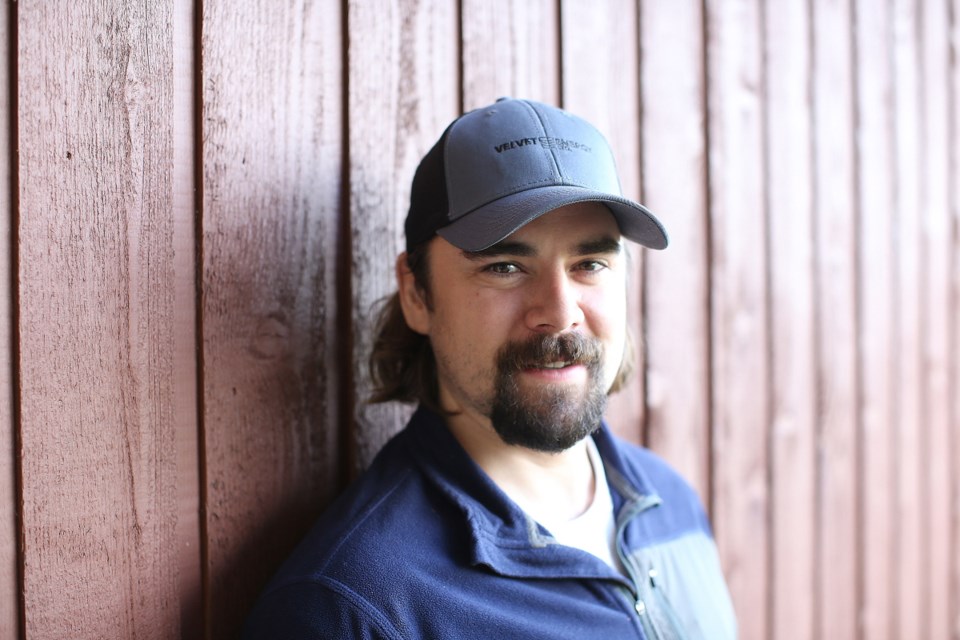Ty James picks a hearty mustard green from a pot of soil on his two-acre farm in Saanich’s Interurban area, on a street aptly named Spring Road. The leaf fades from purple to green and hits the tongue with a hint of sweetness before launching into a peppery aftertaste.
For the government bureaucrat turned tech worker turned millennial-aged farmer, this crop has been surprisingly lucrative.
Chefs at downtown Victoria restaurants are clamouring to feature locally grown arugula, kale and mustard greens on their menus and, as a result, James can turn a healthy profit on salad greens that he sells for $10 a pound. Peashoots and sunflower shoots are high yield and can be grown and sold within two weeks.
That high yield can be both a blessing and a curse. Last summer, James found himself looking at $1,000 worth of fresh basil that was about to spoil. He had already sold as much as he could and didn’t have the processing equipment needed to turn the basil into dried herbs.
That’s when James got an idea that has snowballed into a project that could change the way Saanich farmers sell their food.
He plans to build a processing facility that would flash freeze, dehydrate or liquidize produce and save it from the compost heap.
“We have so much product that isn’t being realized for its economic potential,” James told a group of agriculture enthusiasts. Dressed in black jeans, Blundstone work boots, a fleece pullover, his shoulder-length brown hair tucked under a baseball cap, James floated his idea at the Farmer2Farmer conference held in March at the Saanich Fairgrounds. “It’s going to waste in the shoulder season.”
Example No. 1 is a package of squash sliced into spirals that sells at Thrifty Foods for $6.99 for three-quarters of a pound. Compare that, James said, to a full squash that most farmers sell for $1.89 a pound.
“It’s the exact same product, but realized differently,” he said, with the convincing pitch of an infomercial host but without the cheese.
For James, every rotting post-Halloween pumpkin that didn’t reach jack-o’-lantern status could be turned into bottles of locally produced syrups for pumpkin spice lattes.
“We want to give different capacity to help farmers like us to bring the product to market in new and creative ways,” he said. “No one is exploring the diversity in the market that exists.”
Food trend forecasters have put dehydrated fruits and vegetables on their hot list for 2018. Just think of the beet and parsnip chips that have pushed aside bags of greasy potato chips in the snack food aisle. Companies such as Epicure are selling dried spices, powdered broths, gravies and smoothies made with all-natural ingredients, marketed as a healthy alternative to products laden with sugar or salt.
Chefs at Michelin-starred restaurants and increasingly commercial food producers are using 3D food printers to make edible masterpieces out of liquidized food.
This is why James says it’s imperative that Saanich Peninsula farmers think beyond the confines of a farm stand or market stall.
Many hear the word “processed” and immediately think of rubbery chicken nuggets with 10 per cent “meat protein.”
The processed produce would not have any preservatives or synthetic chemicals, James vowed. “You’re not adulterating the product,” he explained, but simply extracting the moisture that creates bacteria and causes food to spoil.
Island farmers who want their fruits and vegetables processed can use the equipment and enter into a profit-sharing agreement with James’ company.
Currently, the only produce-processing facility on Vancouver Island is Islands West, which specializes in light processing: Think the chopped and assorted fruits and vegetable platters people bring to parties when they’re too rushed to do it themselves.
Islands West purchases the produce in bulk and sells it under their brand or the grocery store brand.
The processing plant would be the first building block in what James calls “a business park for agriculture.”
Technology, James said, could be the solution to farmers’ greatest nemesis: a shortage of low-cost labour.
“I can take a product, peel it, process it, strip it, do all the things that would require a labour force of dozens of people and automate that process, creating more value for farmers,” James said. “If we don’t have to hire a massive labour force to achieve this goal, we can ultimately get a better price.”
James is looking for commercial warehouse space in the Keating Cross Road area. He’s seen a few properties, but the sheen of leftover oil and contaminants meant they would likely not pass Island Health’s food safe standards.
The project is backed by James’s business partner, Rajan Pillay, a former vice-president of Pepsi Co. who is now based in Victoria and runs a venture capital firm called Drads Holdings.
The start-up costs are projected at about $2 million with $350,000-a-year operating costs. James is hoping for revenues of $1 million a year.
So far, farmers have taken positively to the idea.
“From the farmers I’ve talked to, they’re very interested in this. It allows them to reach a new level on their farm without having to make a significant investment or change their business model. We’re giving you more options for how you can potentially bring your product to market and have higher earning potential for wasted product.”
